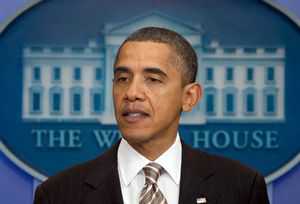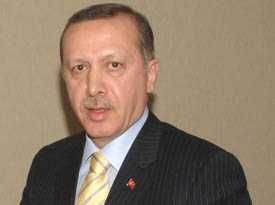WASHINGTON – President Barack Obama has failed to persuade the prime minister of Turkey of the need for sanctions against Iran.
Turkish Prime Minister Recep Tayyip Erdogan (REH’-jehp TY’-ihp UR’-doh-wahn) stressed at a press conference following his White House meeting, that persuading Iran to give up its nuclear ambitions should be left to diplomacy.
He said that he expressed Turkey’s willingness to mediate negotiations between Iran and the West. But he also criticized current sanctions against Iran as being ineffective because of loopholes for Western goods to reach the Iranian market.
The Obama administration may seek new sanctions against Iran in the United Nations Security Council, where Turkey currently votes as a non-permanent member.
THIS IS A BREAKING NEWS UPDATE. Check back soon for further information. AP’s earlier story is below.
WASHINGTON (AP) — Seeking more help in the war in Afghanistan, President Barack Obama praised Turkey for its “outstanding” contributions there.
Speaking in the Oval Office after a private meeting with Turkish Prime Minister Recep Tayyip Erdogan, Obama said Turkey’s commitments have helped bring stability to Afghanistan. Turkey took over the rotating command of the NATO peacekeeping operation in Kabul last month and doubled its number of troops to around 1,750. However, it has resisted repeated U.S. requests to send its troops on combat operations.
Last week, Obama ordered 30,000 more U.S. troops be sent to Afghanistan. The administration expects its allies to provide up to 10,000 reinforcements.
Obama also expressed his condolences for a recent terrorist attack in Turkey, and said the two leaders reaffirmed their commitment to defeat terrorism “regardless of where it occurs.”
At least five Turkish soldiers were killed and several others wounded in an ambush Monday in central Turkey. Authorities have not identified the attackers but Kurdish and leftist militants are active in the area.
Monday’s meeting between the two leaders comes at a time of rising Turkish influence in the Middle East and Central Europe. Before leaving for Washington, Erdogan said Turkey has already contributed the “necessary number” of troops in Afghanistan, and that Turkish military and police will train their Afghan counterparts and press ahead with health, education and infrastructure projects there.
Turkey’s participation in the Afghan mission carries enormous symbolic importance because it is the only Muslim country working with U.S. troops to beat back the resurgent Taliban and deny al-Qaida a sanctuary.
More broadly, however, the United States would like Turkey to use its sway as a regional power and Muslim majority ally to help solve some of America’s trickiest foreign policy problems. But the two sides disagree on many of the important issues.
Turkey has sought to become a mediator for the United States with Iran and Arab countries, but it is unclear whether the Obama administration is eager for Ankara to play that role. The two sides disagree on sanctions against Iran and the Obama administration is uneasy about recent Turkish disputes with Israel.
Greater friction is looming as the Obama administration intensifies pressure on Iran to end its nuclear ambitions. A U.S. push for sanctions at the U.N. Security Council, where Turkey currently sits as a nonpermanent member, will force Ankara to choose between a NATO ally and an important neighbor.
The two allies also will need to navigate the perennial issue of an annual U.S. statement on the World War I-era massacre of up to 1.5. million Armenians by Ottoman Turks. Breaking a campaign pledge, Obama has refrained from referring to the killings as genocide, a term widely viewed by genocide scholars as an accurate description.
The Obama administration has said it is wary that the sensitive issue could upset talks that could lead to reconciliation and a reopening of the border between Armenia and Turkey. It remains unclear how the administration will handle the issue in the future, especially if talks between Turkey and Armenia falter.
Tensions have eased over cooperation in Northern Iraq. Turkish complaints about a lack of U.S. help in rooting out Kurdish militants launching attacks on Turkey from Iraq loomed over Erdogan’s White House visit with former President George W. Bush in 2007.
Since then Turkey has boosted trade in the region and improved ties with members of the Kurdish minorities living on both sides of its border with Iraq.






